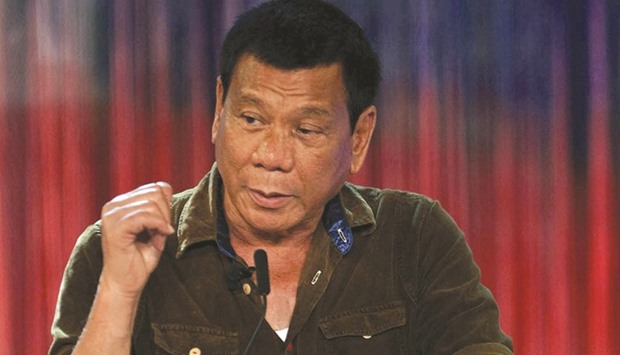In a speech in Davao City, Duterte said he was considering suspending the writ as it is among the constitutional provisions “intended to protect the Republic of the Philippines.”
“If lawlessness spreads, I might be forced to — I don’t want, it’s a warning but I don’t want to do it because it doesn’t look good – but if you force my hand into it, I will declare the suspension of the writ of habeas corpus,” he said at the launching of Pilipinong May Puso Foundation Inc.
In September, Duterte placed the country in a “State of Emergency on Account of Lawless Violence in Mindanao” following the blast in a night market in his home city of Davao that killed 15 people.
But the president quickly made it clear he would not place the country under martial rule.
“I will declare the suspension of the writ of habeas corpus, not martial law. I have no intention to play politics,” Duterte said.
The president said he had “no remedy” to the drug and terrorism problems, citing the attacks waged in Mindanao by the Maute terror group, which was tagged in the September 2 Davao City blast.
“I will declare a suspension of the writ of habeas corpus, I will pick them all up. I will bring them to Samal Island. I will open up Samal Island in the middle so they sink with it,” Duterte said in a mix of English and Filipino. “They choose. It’s true. If you don’t give me a choice then you box me in a corner and I find myself helpless.”
If the Supreme Court blocks the suspension of the writ, the president said he would remain undeterred.
“Those are really provisions intended to protect the Republic of the Philippines. I can be ordered by the Supreme Court to stop it but there are things that they cannot, and maybe, I will not, stop,” Duterte said.
“I’ll tell them I will finish this first then I can go to jail. File all the charges that you can think of. But this country, in my time, will not deteriorate any further,” he added.
The writ of habeas corpus refers to the power of the courts to require the state to produce a person in custody.
Under the Constitution, the suspension of the privilege of the writ is only allowed with respect to “persons judicially charged for rebellion or offences inherent in or directly connected with invasion.”
Once suspended, authorities will have the power to arrest anyone without a warrant. It also allows prolonged periods of detention without charges.

